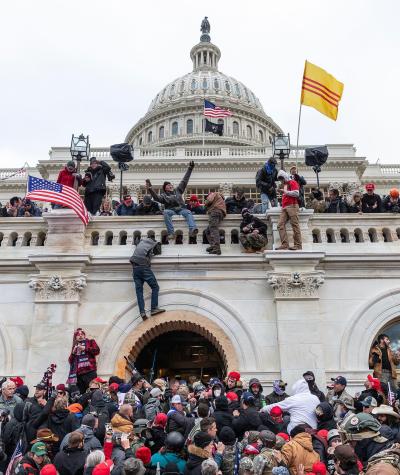Trevor Potter, Campaign Legal Center’s (CLC) founder and president, submitted an in-depth, written statement to the U.S. House of Representatives Select Committee to Investigate the January 6th Attack on the United States Capitol ahead of its first hearing on June 9th.
His expert statement emphasized how the events of that day and the ongoing threat of election sabotage pose a danger to our freedom as voters and our freedom as a country.
The bipartisan congressional committee investigating the January 6th attack is seeking the truth. To date, the committee has conducted more than 1,000 interviews and collected more than 100,000 documents. The upcoming hearings are an important opportunity for the public to now learn what the committee has discovered and hold bad actors involved in the attack accountable.
They should also shine a light on how a lack of trust in our elections helped fuel the January 6th attack and what should be done to make sure an event like this can never happen again.
In a democracy, voters choose our leaders and determine elections outcomes, but emerging threats — like state-level bills reducing Americans’ freedom to vote, sham election reviews, attempts to undermine nonpartisan election administration, and threats against election officials that criminalize them or inject partisanship into their roles — could hurt our ability to do that.
The work of organizations like CLC traditionally focused on combatting restrictions on the freedom to vote and improving voting access until the 2020 election, when partisan politicians and bad actors started sowing distrust about the integrity of our democratic process.
While the 2020 election is over, these false narratives continue to undermine Americans’ confidence in elections and government.
By the end of 2021, state lawmakers had put forth, approved and implemented a record-shattering number of anti-voter laws. This included 581 proposals limiting the freedom to vote, with 52 of those being enacted into law across 21 states.
Similarly, new laws and practices have arisen that allow for partisan interference in election administration and the rise of sham election reviews, designed to undermine legitimate election results and mislead the public. This is when unqualified partisan politicians or groups associated with them demand to examine ballots even after election officials have certified the final results.
Last year, 200 bills in 41 states were suggested that would have given partisan lawmakers greater power over election administration. At least two dozen of these bills have been signed into law.
These changes to state election law support partisan lawmakers in their efforts to take power away from voters while removing or decreasing the power of nonpartisan election officials. This makes it harder to stop future election crises.
Several states have also put laws on their books that impose strict punishments on election officials for committing small errors, or in the case of Arizona law H.B. 2492, force election officials to abandon their duties to register voters under national law unless they want to face prosecution under state law.
Election officials are already facing other challenges, like increased levels of harassment and threats. This, along with the laws mentioned above, are driving many away from their critical roles, with 30% of polled election officials reporting knowing one or more workers who have already left their job.
CLC has been fighting anti-voter laws in states across the country through education and advocacy work and through lawsuits in states like Kansas and Georgia. CLC has also criticized states for implementing laws creating sham election police forces and instead guided voters through what happens to their ballot after they vote to increase trust in elections.
However, without national baseline standards, these efforts can only go so far. Congress should update the Electoral Count Act (ECA), which would ensure that voters determine the outcome of presidential elections, and pass other laws safeguarding the freedom to vote, including ones that would expand access to same-day voter registration, early voting and mail voting.
Congress should also crack down on the election disinformation fueling distrust in our political system, especially by stopping the spread of election lies through campaign fundraising, and approve laws that would protect state voting equipment, voters’ ballots, counting processes, election officials and volunteers.
No matter our color, background or party, most of us believe that January 6th was an attack against our country and our freedom. Americans’ trust in government is at historic lows, and nearly two-thirds of us believe that our democracy is, “in crisis and at risk of failing.”
The January 6th Committee is working to fully investigate, seek justice and hold accountable bad actors involved in this attack on our country. But Congress must also use the findings of these hearings to take action to guarantee that voters, not partisan politicians, decide the outcome of future elections.
